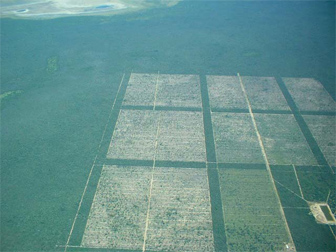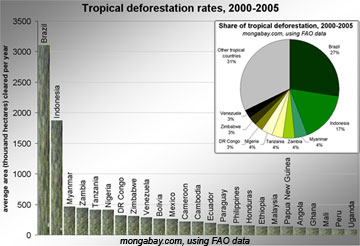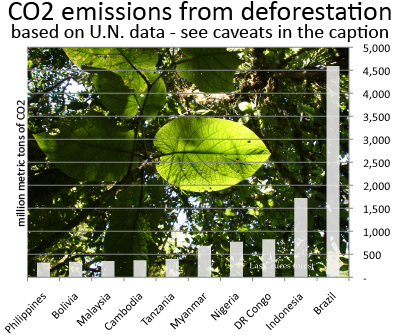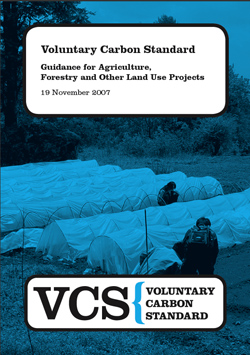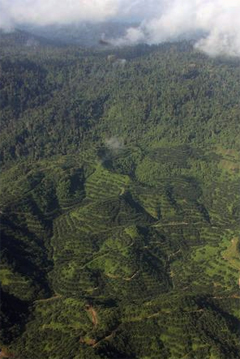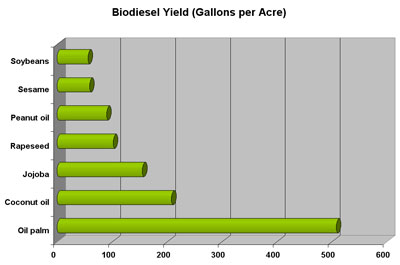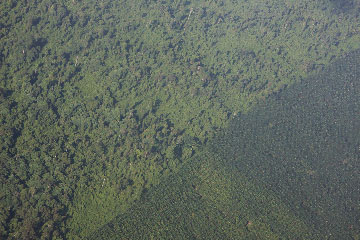From REDD to HEDD
WRM contribution to the Convention on Climate Change
November 2008
Forests, everyone knows, are good for the climate – which makes it all the more important that governments and international community should work to protect them. But many current efforts to link forest conservation with climate change mitigation are sadly confused. It is important that parties to the UN Convention on Climate Change understand why.
The trouble begins with a misunderstanding of deforestation’s role in causing climate change. It is often asserted that because deforestation is responsible for 20% of greenhouse gas emissions, it is also responsible for 20% of climate change. The implication is clear: other things being equal, 20% of the world’s climate change mitigation efforts should go toward trying to halt deforestation.
However, the argument is invalid. Deforestation is not only less responsible for climate change than the burning of fossil fuels; it is also related to climate change in a very different way. Even if 20% of the carbon dioxide being emitted today does indeed come from deforestation, it does not follow that deforestation is 20% responsible for climate change. The carbon dioxide molecules resulting from deforestation may be chemically identical to those coming from burning of fossil fuels, but the two are climatologically different. Carbon released from deforestation does not increase the total amount of carbon being exchanged among the atmosphere, the oceans, soils, forests, and so on. Carbon released from fossil fuels, on the other hand, does increase this above-ground carbon pool – adding to the difficulty of keeping excess carbon dioxide out of the atmosphere.
And if not all CO2 emissions are the same, neither are emissions from different types of deforestation and forest degradation. Deforestation caused by monoculture plantation industries that clear forest to plant eucalyptus or oil palm or soya beans upsets the carbon balance between vegetation and the atmosphere for a long time due to its deep, industrial-scale undermining of the land’s capability to grow back forest. The ecosystem is wrecked – water, soil, biodiversity – and local knowledge about how to care for and regrow the forest is often destroyed. Any “deforestation” caused by, for example, the temporary conversion of secondary forest to swidden fields by a group such as the Karen of Southeast Asia is different and less lasting. Such swidden fields are designed to regrow to forest after a space of some years. With enough land and respect for land rights, “deforestation” in one place is balanced by regrowth in another. This type of “deforestation” is, climatically speaking, different from industrial deforestation.
It is therefore crucial for parties to the Convention on Climate Change both not to confuse fossil carbon with biotic carbon and not to confuse industrial deforestation with “vernacular” deforestation. Otherwise they are likely, in the name of “climate change mitigation”, to step up their assault on the most vulnerable – indigenous peoples, smallholders depending on the forest, etc. – while letting off comparatively lightly fossil fuel industries, plantation companies, and other industrial deforesters.
This does not mean that deforestation is not contributing to climate change – far from it – but that it needs to be put in its true perspective if appropriate policies are to be adopted. Deforestation urgently needs to be halted for many social and environmental reasons, including – though not only – their role as carbon reservoirs.
To accomplish that aim, it is necessary first to identify clearly the causes of deforestation and to then find appropriate mechanisms for addressing each of them. Unfortunately, instead of implementing those two steps, governments negotiating at the Convention on Climate Change have so far followed a different approach, hoping that money channeled from North to South will do the trick of preventing the release of carbon from deforestation. But will it?
The REDD approach
Under the Convention on Climate Change, the idea of addressing carbon emissions from forests was initially termed “avoided deforestation”. It is important to note that the term used was “avoided”, and not “avoiding”. This is the starting point of the problem. While “avoiding deforestation” is what actually needs to be done in all countries, “avoided deforestation” means only that a country has deforested less than before, even if it continues to deforest. More importantly, it promises countries financial compensation for areas where deforestation was allegedly “avoided”.
The concept later evolved to what is now termed REDD, which according to some means “Reducing Emissions from Deforestation in Developing Countries”, while for others, it stands for “Reducing Emissions from Deforestation and Forest Degradation”. The difference between the terms is that while the former is limited to deforestation, the latter also includes forest degradation. In terms of expected funding, the second REDD would therefore allow for the inclusion of more countries than the former.
The REDD discussions are immersed in a North-South diplomacy game in which:
- The North blames the South for the emissions resulting from deforestation – and the South generally fails to challenge the claim.
- The South maintains that its “right to development” implies the need to “convert” its forests to productive activities – and the North generally fails to challenge the claim.
There are of course exceptions to the above, and many nuances to be added, but that is the main scenario, starting from which the diplomacy game becomes a financial game, where money channeled from the North to the South will reduce the “need” for deforestation without compromising the South’s “right to development.”
However, the two assumptions above need to be challenged:
- In fact, Northern countries share much of the responsibility for deforestation in the South. In almost all cases of large-scale forest destruction there is a clear link to Northern corporations, Northern agencies or Northern consumption. Whether it is industrial logging, mining, oil exploitation, dams, industrial shrimp farming, agrofuels, oil palm, pulp and paper, Northern actors are either directly involved in or benefit from the products extracted from the areas deforested or degraded.
- In fact, large-scale deforestation does not lead to development in the South, at least not in the sense of meeting the needs of the present while not compromising the ability of future generations to meet their own needs. What all the available evidence shows is that Southern forest destruction benefits the North and Southern elites, while increasing widespread dispossession and poverty in the South.
In addition, it should not be forgotten that Northern countries are the ones most responsible for climate change, both through their past and current levels of greenhouse gas emissions at home as well as through their past and present responsibility over emissions in the South.
One of the problems of the REDD discussion is that by focusing on 20% of the emissions (deforestation), it is keeping the most important 80% out of sight. Deforestation is of course part of the problem, but the main issue still lies in the fossil fuel emissions that are destroying the Earth’s climate. Fossil fuel emissions are not only greater in volume but also different in kind (see “The two carbons” below), impacting much more heavily on climate change. While it is certainly true that Northern countries are to blame for climate change, this does not imply that they can pay their way out of their responsibility through funding for “reducing” deforestation and even worse, through a forest-related carbon market mechanism that enables them to “offset” their fossil fuel emissions elsewhere.
In relation to the last point, it is important to highlight that the current negotiations on REDD involve two main approaches for channeling funds to countries that can prove that they have “avoided” or “reduced” deforestation: a grant mechanism or a carbon market mechanism. While both mechanisms have their drawbacks, it is necessary to explain why the latter is useless from a climate perspective.
BOX: The two carbons
Carbon trading involving forests is based on the premise that carbon is carbon, and that the carbon released from deforestation is the same as the carbon released from burning fossil fuels. This is simply not true.
The carbon released through the use of fossil fuels (coal, oil and natural gas) has not been part of the functioning of the biosphere for millions of years. Once fossil fuels are extracted and burnt, that carbon – which until then had been safely stored underground – is released, thereby increasing the aboveground carbon stock. Once released, that carbon cannot be returned to its original storage place and the more is extracted, the more the total amount of carbon in the biosphere is increased.
The release of carbon resulting from deforestation is a totally different matter. This carbon is part of the normal functioning of the biosphere and therefore, though deforestation increases the concentration of carbon dioxide in the atmosphere – thereby contributing to the greenhouse effect – it does not result in a net increase of the aboveground carbon stock.
It is clear from the above that a REDD mechanism based on a carbon market would result in a constant net increase in the amount of carbon in the biosphere, because it would allow Northern countries to “compensate” for their fossil fuel-related carbon emissions by paying Southern countries for “avoiding” the deforestation of an area of forest containing the same amount of carbon as the one released from fossil fuels. The result would be a fake “carbon neutrality”, which would be put forward as a justification for avoiding the pressing need for cutting fossil fuel emissions.
The alarmingly frequent news of ice quickly melting in the Arctic and from an increasing number of glaciers throughout the world support recent claims that emissions in the North need to be cut drastically (90%) in order to avoid the global temperature to rise more than 2°C as compared to pre-industrial levels. If the temperature were to rise more than that, runaway climate change would become irreversible. As environmental writer George Monbiot clearly explains, “Even if, through carbon offset schemes carried out in developing countries, every poor nation on the planet became carbon-free, we would still have to cut most of the carbon we produce at home. Buying and selling carbon offsets is like pushing the food around on your plate to create the impression that you have eaten it.”
In the present climate change context, the conclusion is that a carbon market-based REDD must be opposed on the grounds that it will lead to an increase in fossil fuel emissions, thus aggravating climate change.
Can money save the forests?
The second approach to REDD – a grant mechanism – would imply that Northern governments acknowledge their responsibility over climate change and are willing to assist Southern countries in conserving their forests, thereby avoiding the release of the carbon contained therein. At least from a climate perspective, this approach would make sense if accompanied – at the same time – by substantial reductions of fossil fuel-related emissions in the North.
The mechanism gives rise, however, to a number of questions, among which are the following: Where would the money go? Who would receive it? Under what conditions?
The most appealing approach would be to grant indigenous or traditional forest communities money for the forest conservation that they are already carrying out.
The problem is that REDD money is not aimed at that type of situation, because its objective is to reduce emissions from deforestation. That implies a scenario where, unless money is made available, the forest will be destroyed.
If REDD were to be implemented, some showcase projects would provide funding to forest communities – which would be used as publicity for promoting REDD and as a way of dividing NGOs, Indigenous Peoples’ Organizations and community groups. But these would be the exception to the rule. Most REDD money would go – by definition - for “avoiding” the deforestation that would occur if no funding were made available.
This type of REDD would imply:
- That no money would be channeled to countries with no deforestation.
- That communities that are not actively destroying the forest would not be eligible for REDD funding.
The above would result in a number of perverse consequences:
- Countries with a good record of forest conservation would receive nothing.
- REDD might encourage countries to deforest in order to be eligible for funding in the future.
- Those most responsible for deforestation (governments and corporations) would be the main beneficiaries of REDD, because they are the ones that could actually – if adequately paid – avoid the deforestation they are responsible for.
- Money would be made available if deforestation is simply “reduced” and not stopped, which could mean, for instance, that a country could be paid for destroying “only” 1 million instead of 2 million hectares of forest.
- REDD money could assist governments and large conservation organizations to deprive local communities of their right to use their forests.
- Deforestation “avoided” one year – and paid for – could occur during the following years.
To make matters worse, the definition of “forest” adopted by the Climate Change Convention includes tree plantations as such, which means that monoculture tree plantations – eucalyptus, pines, acacias, oil palm and others – would be counted as forests and their further expansion over real forests could be even subsidized through REDD money. In all cases, massive conversion of forests to tree plantations would not even be counted as deforestation because – according to the definition – the area would still be covered by (a different type of) “forest”.
The need for a broader approach
Everyone agrees – at least in theory – that large-scale deforestation needs to be stopped, not only to avoid carbon emissions but also to regulate climate and the water cycle, to conserve biodiversity and soils, and to ensure the rights and livelihoods of forest-dependent peoples. The question lies less in the “why” than in the “how”.
As explained above, the REDD approach – be it grant or market related – has a number of drawbacks. At the same time, it is implicitly based on the assumption that it is markets – and not governments – that decide on the fate of the forests. Without denying the importance of markets, the fact is that the opposite is much nearer to the truth. It is governments – both Southern and Northern – that establish the conditions, through policies, laws and regulations, that result in either forest destruction or in forest conservation.
The principal approach to forest conservation should therefore lie in government policies and commitments for halting – not just “reducing”– deforestation. Such policies and commitments should be put in place by ALL governments, North and South. Given the inability shown until now by governments and international UN bodies to undertake such a programme, it is essential that peoples’ organizations – in North and South – become involved in making sure that commitments for halting deforestation are implemented in a socially just manner by all governments. It should be ensured that:
1. Northern governments:
- Identify their own role in forest destruction in the South (the direct and underlying causes of forest loss) and take measures for addressing them.
- Prevent corporations headquartered in their own countries (in the production, trade and financial sectors alike) from carrying out activities that result in forest destruction in the South.
- Prevent bilateral and multilateral institutions (e.g. bilateral agencies, World Bank, IMF, regional banks) from promoting forest destruction.
- Ban the import of all types of goods – ranging from timber to agrofuels, from aluminium to oil, from shrimps to pulp- produced at the expense of forests.
- Ban deforestation in their own countries.
2. Southern governments:
- Identify and address the direct and underlying causes of deforestation.
- Ensure the legal recognition of forest and forest-dependent peoples’ rights to use their forest lands, including their right to continue their traditional forest management systems (e.g. rotational use of forest lands for providing to their needs).
- Promote community forest management systems supported by forest-dependent peoples
At the same time, Northern governments need to acknowledge their past and present role in climate change and in deforestation and commit themselves to supporting Southern countries in forest conservation. Contrary to the prevailing REDD approach, financial support should be provided to countries that put in place and implement policies that ensure the conservation of forests and the rights of forest and forest-dependent peoples. Additionally, mechanisms should be established to ensure that the money will be shared between relevant government agencies and the communities involved in forest conservation.
Corporations involved in forest destruction should not be “compensated”.
Of course deforestation cannot be halted in a day, but what can be done immediately is to move quickly from a market-based mechanism for “reducing” emissions from deforestation to more realistic policies that halt additional emissions from this source. Hence the need for HEDD: Halting Emissions from Deforestation and Forest Degradation in all countries.


